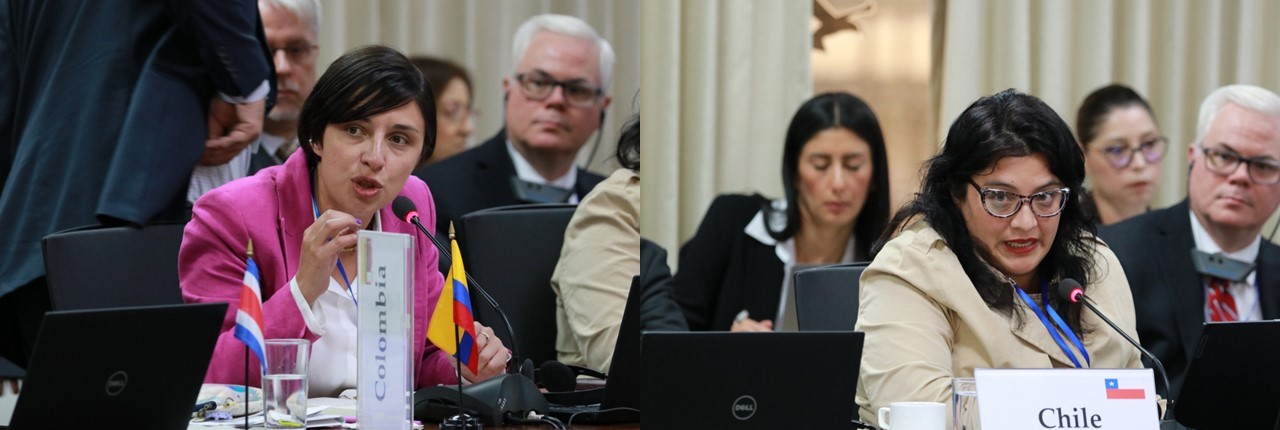The panelists emphasized the social and productive contributions of family farmers who, nevertheless, are the weakest link in the chain, often suffering from poverty and facing multiple obstacles to access basic services.

San Jose, 6 October 2023 (IICA) – Family farming is of strategic importance to the hemisphere and cooperativism affords a valuable means for improving its performance and capitalizing on its opportunities, agreed agricultural ministers and leaders during the Conference of Ministers of Agriculture of the Americas 2023, which is being held at the Headquarters of the Inter-American Institute for Cooperation on Agriculture (IICA) in San Jose, Costa Rica.
This was one of the conclusions of the forum entitled “Including Family Farming, Women and Youth in the Development of Agrifood Systems”, which was kicked off by Graciela Fernández Quintas, President of the International Cooperative Alliance for the Americas (ICA), who delivered a keynote speech.
The panelists emphasized the social and productive contributions of family farmers who, nevertheless, are the weakest link in the chain, often suffering from poverty and facing multiple obstacles to access basic services.
Participating in the conference organized by IICA, which will continue until Thursday, 5 October, are ministers and senior agricultural officials from 34 IICA Member States, high-level national authorities, representatives of international agencies, rural leaders, internationally renowned academics and representatives of the production and industrial sectors.
The Presidents of Panama and Guyana, Laurentino Cortizo and Mohamed Irfaan Ali, were speakers at the opening ceremony and were recognized by IICA for their commitment to agriculture and regional food security.
“Cooperatives are key players in sustainable development”, stated Fernández Quintas on behalf of ICA, which represents 315 member cooperatives throughout the region.
“We existed and resisted over time. There are more than 3 million cooperatives in the world; they have more than 120 million members and generate 280 million jobs, which represent close to 10% of the world’s total jobs”, she explained.
Producers living in poverty
Fernández Quintas underscored the tremendous diversity of the hemisphere’s agrifood systems, but warned that rural dwellers face a complex scenario, given that millions of them are living in poverty. “If we consider our potential for transformation, results still fall short. That is the sector’s greatest challenge”, she acknowledged.
She also admitted that “the rural population is aging. We must open up opportunities for young people. There is a dire need for generational succession in the countryside”.
In that regard, she called for ensuring that cooperatives not only have a voice in decision-making, but are also included in agricultural policy making by countries.
“Without agricultural production”, added Fernández Quintas, “there can be no food or food security, and no business either. Family farming is of strategic importance. And cooperatives are a valuable tool that can bolster their negotiation capabilities, improving not only the sale of products, but also the purchase of inputs and access to services”.
She also pointed out that cooperatives in the Americas are self-managed enterprises that manage financial resources for themselves and their members and provide opportunities to empower rural women and for youth to exchange knowledge, thereby combating migration from the countryside to cities.
Martha Carvajalino, Deputy Minister of Rural Development of Colombia, agreed that family farmers play a decisive role in food security.
“They produce 60 or 70% of the food we consume, but they are the most vulnerable members of society; they face the greatest limitations in the access to goods, but also in terms of social recognition”, she said.
Carvajalino underscored the need to support farmers in Colombia in caring for the environment and contributing to peacekeeping in rural areas.
Andrea García, Director of Chile’s Office for Agricultural Policy Studies (ODEPA), said that, of the 230,000 family farmers in her country, 22% are women.
“Our sector is aging”, she admitted, “and we are working to support family farmers and peasants by reducing the gaps they face in accessing natural and production resources. For instance, we are working to improve access to credit for irrigation, which was out of reach for small-scale farmers”.
More information:
Institutional Communication Division.
comunicacion.institucional@iica.int











